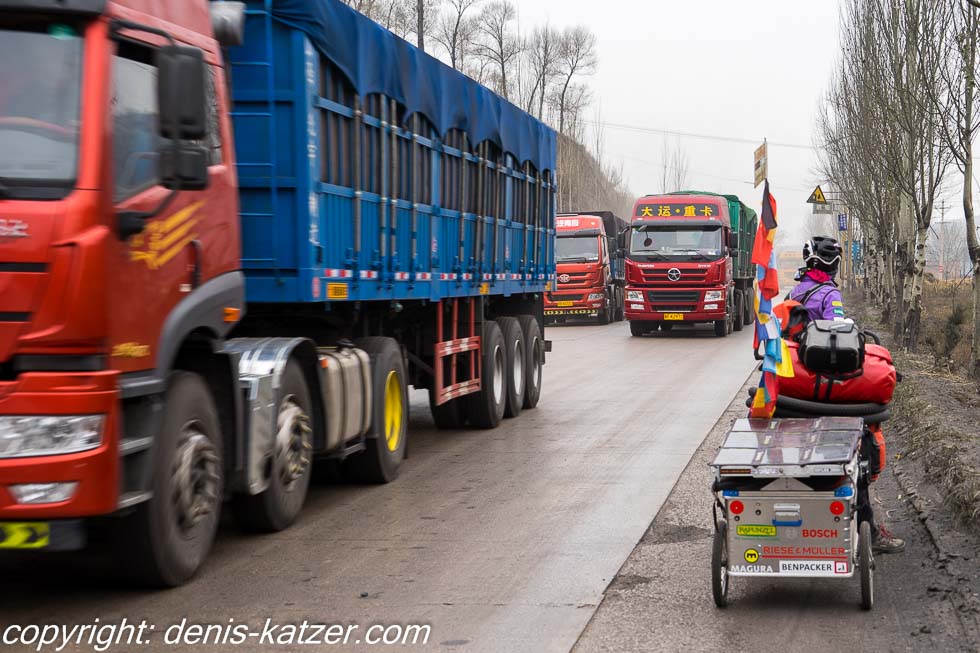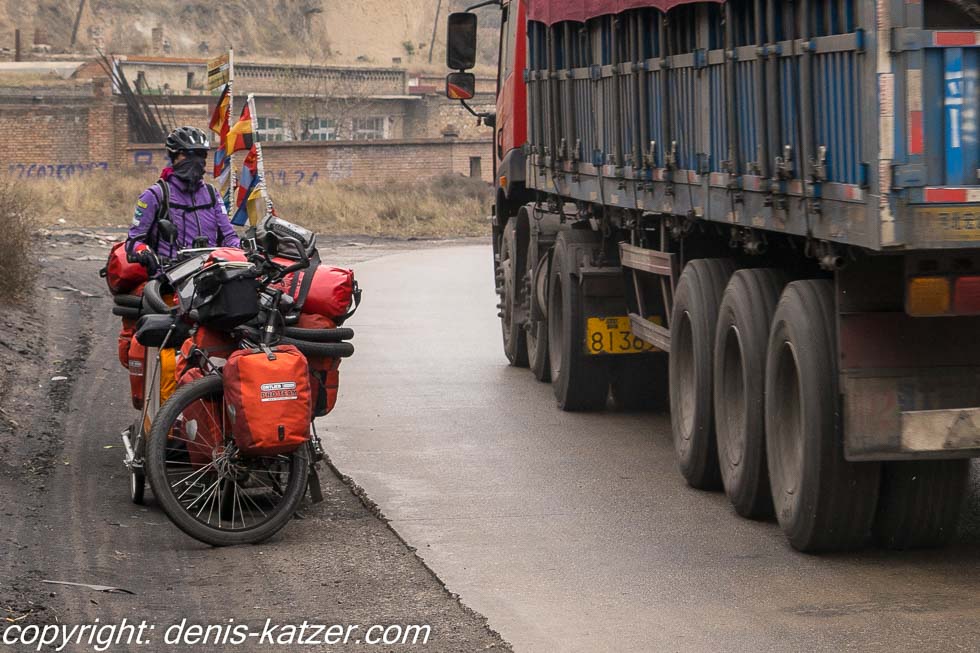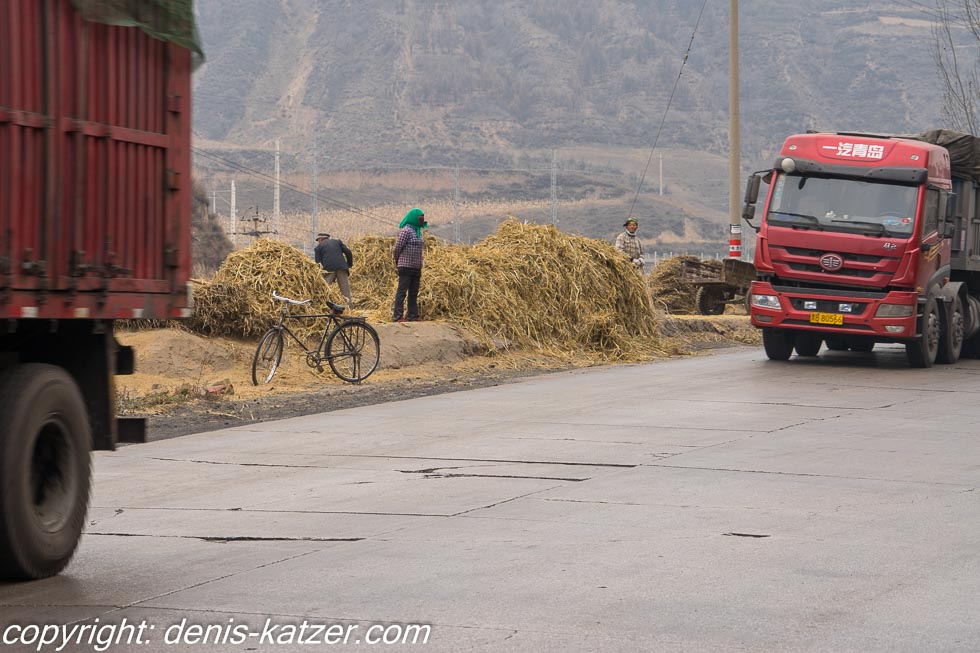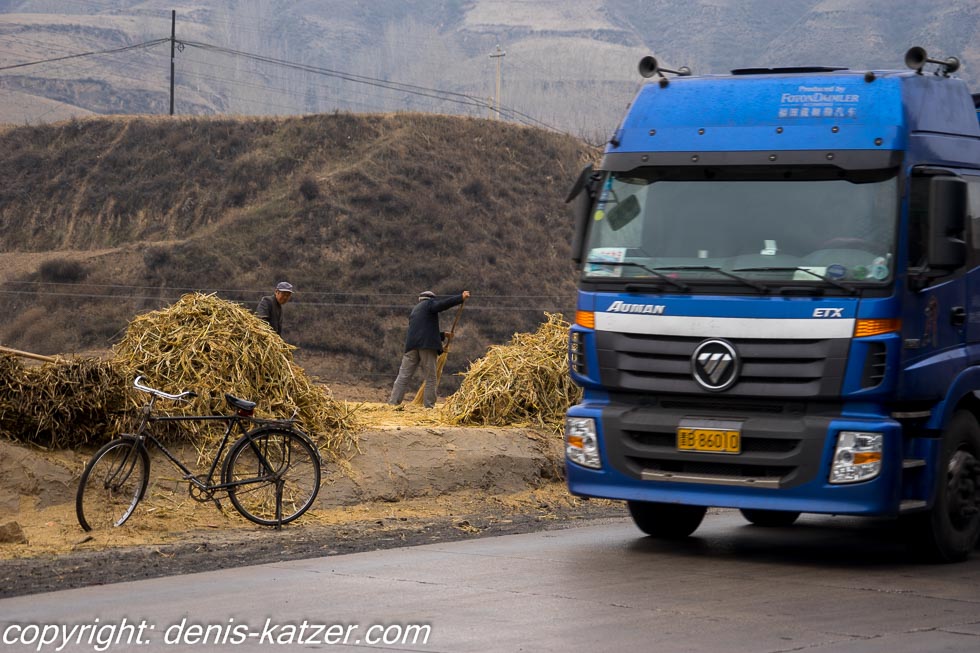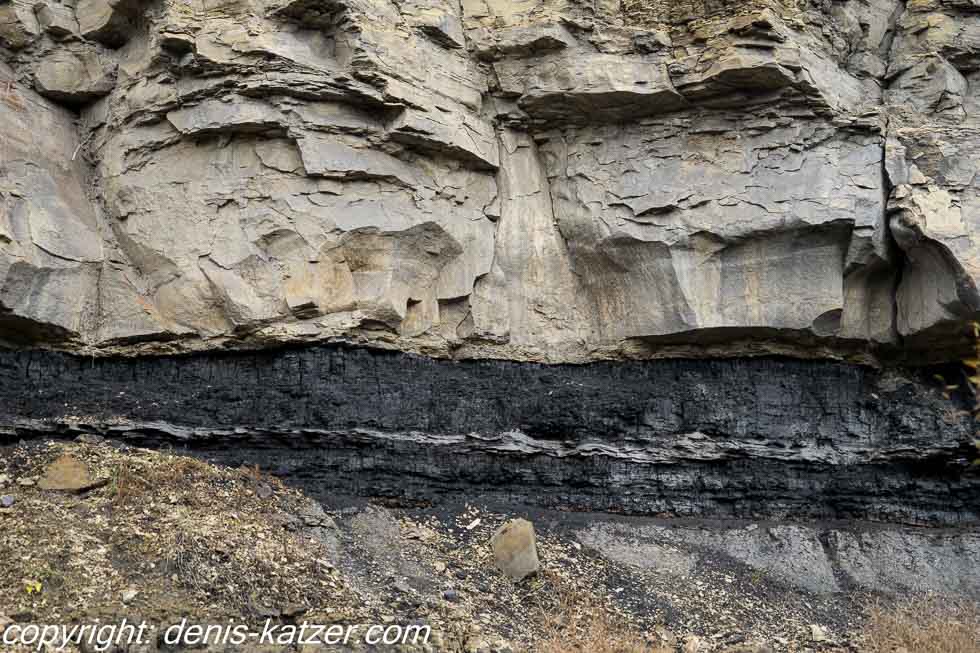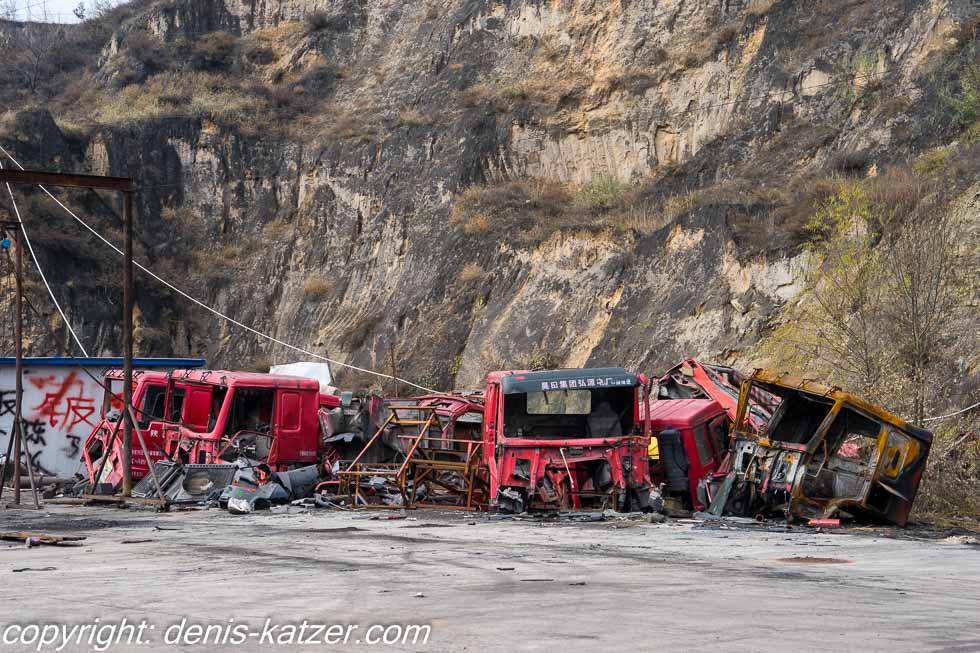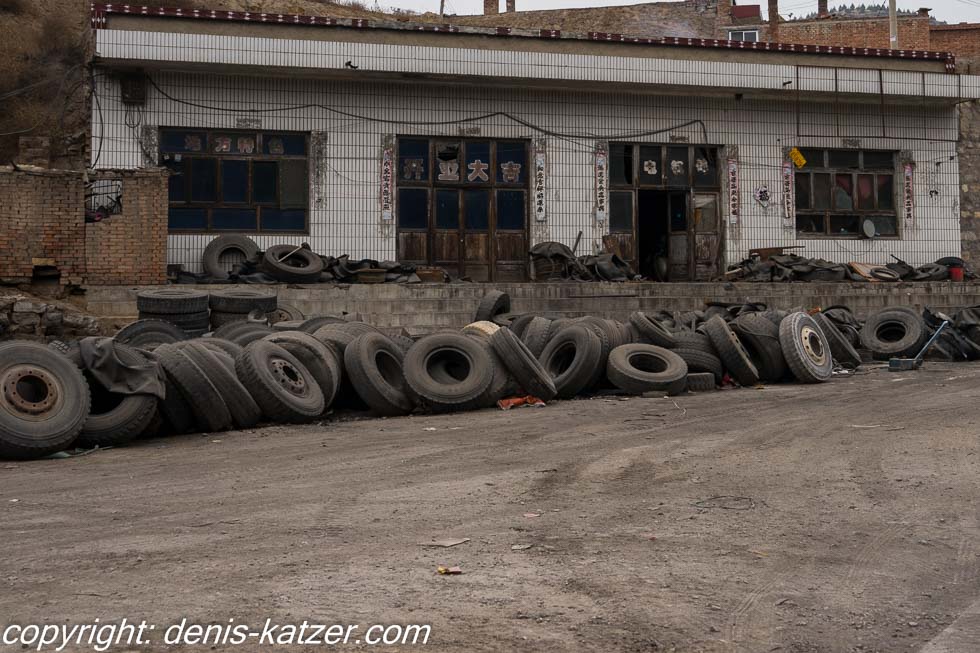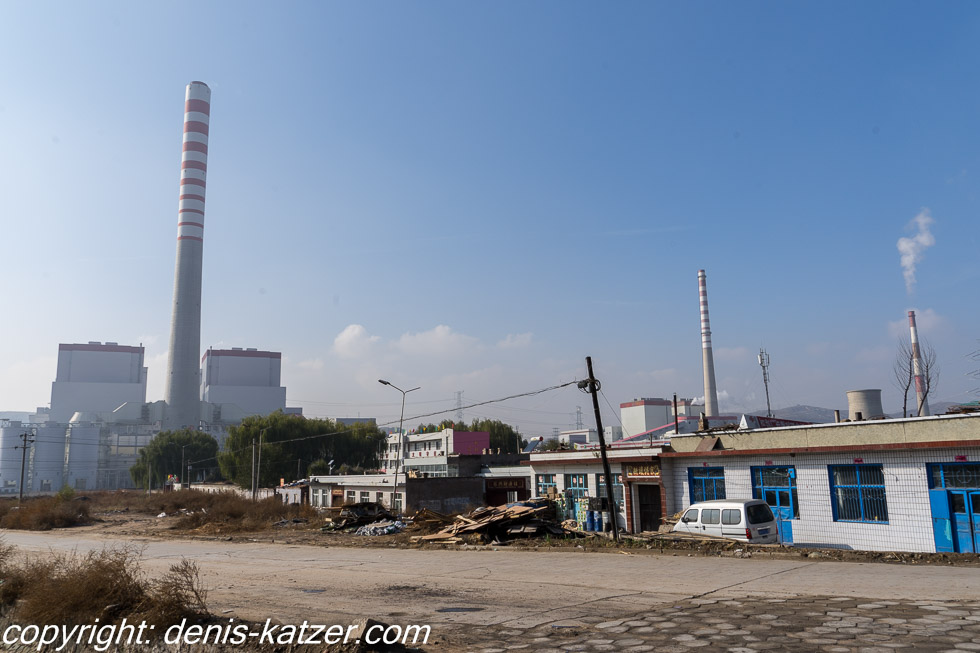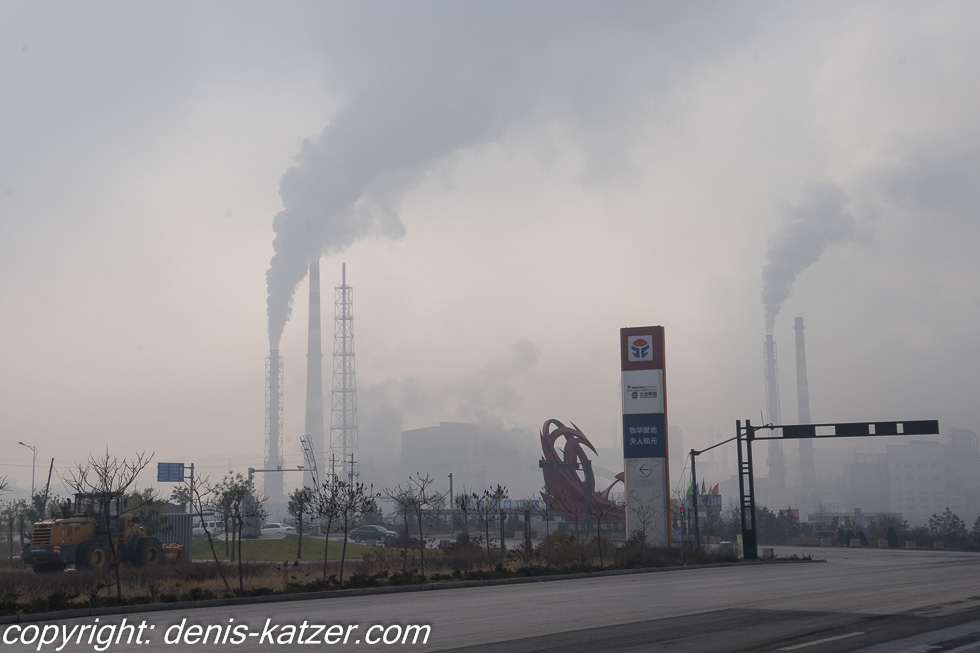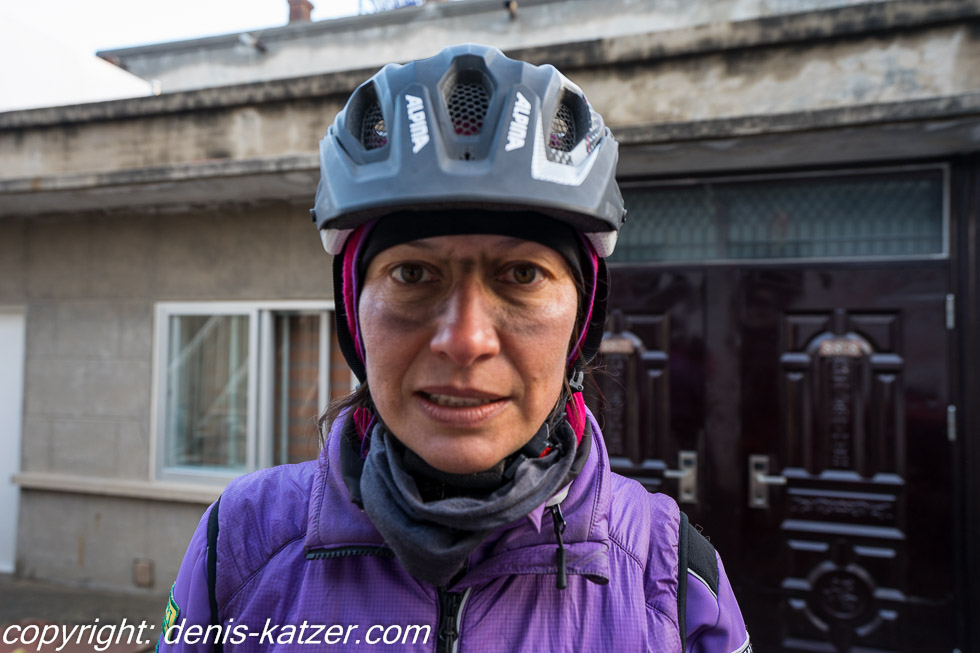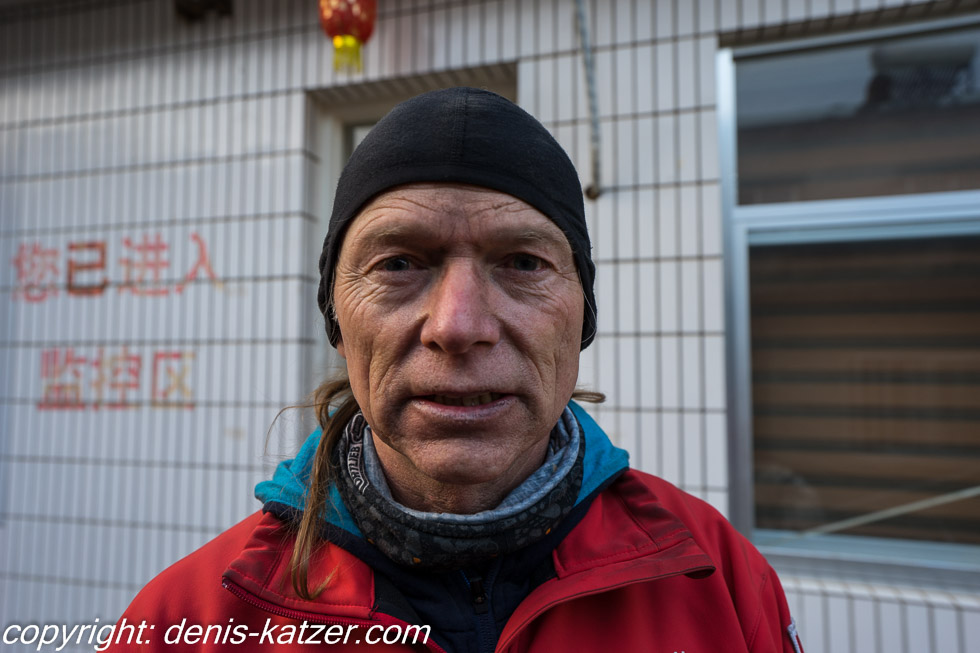
Life-threatening road of a hundred thousand trucks
N 39°01'20.1'' E 111°05'02.7''
Date:
04.11.2015 to 08.11.2015
Day: 129-133
Country:
China
Province:
Shanxi
Location:
Baode
Latitude N:
39°01’20.1”
Longitude E:
111°05’02.7”
Daily kilometers:
135 km
Total kilometers:
10,457 km
As the crow flies:
96.86 km
Average speed:
23.6 km/h
Maximum speed:
44.2 km
Travel time:
5:48 hrs.
Soil condition:
Poor asphalt
Maximum height:
1.300 m
Total altitude meters:
6.861 m
Altitude meters for the day:
350 m
Maximum depth:
750 m
Headwind Wind force: 4
20 km/h
Sunrise:
07:05 a.m.
Sunset:
5:32 pm
Temperature day max:
15 °C
Temperature day min:
8 °C
Departure:
10:00 a.m.
Arrival time:
5:30 p.m.
Total plate tires:
8
Plate front tire:
2
Flat rear tire:
5
Plate trailer tire:
1
(Photos of the diary entry can be found at the end of the text).
LINK TO THE ITINERARY
Link to the short movie
The weather forecast for today predicted these swampy, cloudy skies with astonishing accuracy. Not a single ray of sunshine illuminates the sad-looking, exhaust- and dirt-ridden area through which we steer our aluminum steeds. Again, the first few kilometers on the road away from the city are pleasant to drive. The cars, electric scooters and loud three-wheeled motorcycles whizz, whirr and rattle past us without causing us the slightest stress. But the peace doesn’t last long. Even from a distance, we can see our peaceful arterial road approaching the S305 in a wide arc, only to be literally devoured by it. While the last few weeks have already seen terrible conditions on the highways, the S305 is developing into a new level of madness that we have never seen before. As if an oversized monster anaconda, made of sheet metal and rusted steel, were crushing everything around it with its oversized muscles and devouring every individual with its huge mouth, the avalanche of metal rolls along ruthlessly. Thousands, perhaps tens of thousands of trucks thunder past us tiny creatures in both directions with a tremendous roar and clatter. We stare at the black tarred strip, somewhat confused and helpless. “We have to go that way?” asks Tanja meekly. “Yes. There’s no other option,” I reply, wondering how a little cyclist is supposed to survive such traffic madness. With adrenaline pumping, we thread our way into the traffic and pedal along the hard shoulder. “Watch out for the speed bump!”, I shout as a speed bump running across the road forces the heavy goods traffic to get on their feet. This is the only way to prevent axle breakage. We do the same as the trucks so as not to be thrown out of the saddle or break our systems. For reasons that are not clear to us, these dangerous speed bumps regularly appear at irregular intervals. Some of them have been overlooked so often by the coal-laden metal monsters that they have worked their way through the tons of pressure into the asphalt. Some, on the other hand, have been torn to pieces and scattered wildly across the road. Some of the steel or reinforced concrete speed controls have been shredded out of the asphalt by the large truck wheels, so that only the ends of the steel bolts are still visible and we have to wind our way over or through them.
“Tuuuhhhhht! Tuuuhhhhht! Tuuuhhhhht!” it roars just half a meter next to us. I don’t know whether the drivers want to warn us, annoy us or just greet us. Surely you can’t imagine how such a loud horn can hit an unprotected cyclist in the limbs. My nerves have become damn thin by now. I find it increasingly difficult to maintain the necessary concentration. If I honestly admit it to myself, the incessant threat posed by the terribly loud trucks is tantamount to psychological torture. We can only pray that not all of China’s streets are infested with such terror. Then there is the unspeakable dirt. People seem to throw everything away here. The roadsides are often full of scrap metal and garbage covered with a centimeter-thick layer of coal dust. In the villages, everything that cannot be used is dumped into the rivers and streams. The mountain slopes on which some settlements are built consist partly of garbage dumps. In addition, there are regions in which one coal-fired power station after another blows its environmentally harmful and unhealthy carbon dioxide, sulphur dioxide, fly ash, particulate matter and heavy metals into the tortured sky. The wind carries the gray-black clouds away and lets them float down on us at this moment. Oh, how are the lungs supposed to cope with that? Now I understand why many Chinese people wear face masks. If you live here, you are bound to die of cancer.
Suddenly, the hard shoulder that has offered us at least a little protection until now comes to an end. Coarse rock and thick coal dust have taken its place, so that from now on we are forced to share the asphalt with the trucks. “Tuuuhhhhht! Tuuuhhhhht! Tuuuhhhhht!” it sounds behind us. “Where are we supposed to go?” I shout. “Take it easy Denis! Don’t get yourself worked up. It’ll only cost you your concentration!” Tanja warns me. “It’s okay,” I reply, knowing full well how right she is. “Tuuuhhhhht! Tuuuhhhhht! Tuuuhhhhht!”, it screams as a truck comes towards us, overtaking one of its colleagues on a steep pass road. “He’s crazy!” I shout, slam on the brakes, leave the road at the last moment and save myself on the hard shoulder covered with rough stones. Tanja reacted very well and also saved herself close behind me in the scree. “Wooouuuhhh!” hisses the madman with his overloaded coal transporter, causing small pieces of coal to fall on us. The cloud of coal dust that sweeps across the road in the wake of the monster envelops us and obscures our view for a moment. “Phew, that was close,” I say, coughing. After a few seconds, we recover from the shock and continue our journey. “Imagine a golden egg in which you sit and whose energy shell protects you!” advises Tanja. In fact, this idea has already protected us on Serbian, Romanian, Ukrainian and Russian highways and expressways. “Okay, I’ll do it,” I reply, because at this moment I have no other alternative but to cancel this sky command immediately. But what do we do then? Stand at the side of the road and wave? Hoping to get a lift from one of the stressed drivers? Perhaps sitting on the pile of coal in the back of the loading area? Or hire a van in the next town to take us to the Vietnamese border? There are always highs and lows on a journey like this. There are always sections of the route that are no walk in the park. This is the life of a long-distance cyclist and the life of every human being. At the moment we are cycling through such a psycho low, even though we are at an altitude of over 1,300 meters.
The pass road is bordered on both sides by steep rock faces. Steel structures and nets are installed to stop falling debris. Boulders the size of a child’s head lie on the road in front of us and bear witness to what comes down here. I’m constantly looking up the mountains in the hope that I can avoid a falling stone in time. But that is of course ridiculous. Or not? I have no idea. The incessant noise of the trucks thundering past, the terrible exhaust fumes, the all-enveloping cloud of coal covering us, the fear of missing one of the many holes and deep cracks in the asphalt below us and flying off the trestle in an air roll, or being hit by one of the many falling stones, the latent danger of being overlooked by an inattentive truck driver and dying here in China, the responsibility I feel for my wife, especially because I have put her in this situation, overwhelms my mind. I feel as if the fine carbon build-up is impairing my ability to think. Is that even possible after such a short time? I am aware that the ash from burnt coal contains an increased concentration of heavy metals such as arsenic and mercury, as well as the radioactive elements uranium and thorium. A terrible cocktail that no one wants to inhale voluntarily. And yet coal is used for heating everywhere here. Every household, every hut, no matter how small, has a supply of coal lying outside the door. Everywhere, the chimneys and metal pipes that protrude from the human dwellings smoke and compete with the huge, sky-high chimneys of the partly obsolete power stations. According to official statements, 16 of the 20 cities with the worst air quality in the world are in China. The country is now the world’s largest producer of greenhouse gases due to the economy’s constantly increasing energy requirements. Even if China is therefore one of the main causes of global warming, all industrialized nations on our planet are responsible for it. Ultimately, it’s about saving and preserving our platform for life and not about blaming each other and continuing to pour oil on the burning fire.
(If the Chinese Internet censors are reading this, I would like to point out that we are not here to condemn China. Environmental problems exist in all countries. The extent often depends on the size of the country. Our only concern is that we people, regardless of which nation and which status we belong to, start to think about our actions. We want the children of future generations to have fresh air to breathe, birds to chirp and trees to grow).
Whenever possible, I let my gaze wander over the maltreated landscape. Everything is gray, every mountain hill, river, stream, puddle, every tree, every bush, the people’s houses, the small restaurants. The red lanterns hanging in front are no longer red. Coal has robbed the land of all color. The inhabitants of this mountain region are poor farmers. In the midst of the grey clouds of coal, they set up their corn camps, which was once yellow and has now taken on the color of the world around it. They separate the wheat from the chaff. Everything swirls through the air and mixes with the coal dust, causing the coal to enter the food chain. Food that has inevitably mutated into euthanasia and is offered in every restaurant. The people here must be made of coal. Again, the future of humanity is on my mind. Will we take it so far that we can only live under an artificial bell because the outside world has been irrevocably destroyed by us? Can it be that our prosperity will come at such a high price? Not according to the saying “good on the outside, bad on the inside”, but the other way around. By which I mean under the glass dome it’s all good and outside it’s all bad? The main thing is that we all drive a great car and live regardless. What madness when I look at some of the world’s big cities, whose inhabitants are all at risk of at least lung cancer. What do we humans do to ourselves? 24 hours a day, a deadly avalanche of coal rolls through these gorges and valleys, past their inhabitants who have turned gray. What about their lungs? Are they black? What is their life expectancy? The World Bank estimates that in China alone, 460,000 people die every year as a result of air and water pollution. How many of them come from this valley? In the valley of destruction? In the valley of environmental horror? Millions and millions of tons of black sedimentary rock, formed by the carbonization of plant remains, are dug out of the ground in this province and stored in masses of coal piles, 20 or 50 metres high, right next to the road.
“Tuuuhhhhht! Tuuuhhhhht! Tuuuhhhhht”, it thunders incessantly, mercilessly, brutally and mercilessly. A multi-lane, ultra-modern highway has been blasted and built through the mountain landscape next to the main road. The noise of the cars speeding along there mixes with that of the main road. But that’s not all. The railroad also makes its way over and through the mountains. “Thhhüüüüüiiiiiiiiit! Thhhüüüüüüiiiiiiiiit! Thhhüüüüüüiiiiiiiiiiit!”, the loud horns of some of the tractors join those of the trucks. I look up. Above our heads, a mighty bridge resting on massive concrete pillars straddles the valley. My eyes are amazed to see no less than eight locomotives hanging one behind the other, pulling countless wagons loaded with coal. The shrill thhhüüüüüüiiiiiiiiit of the tractors joins with the deep tuuuhhhhht! of the trucks and the honking of the cars on the highway. In the street village we are cycling through, there are countless repair shops for trucks lined up next to each other. Compressed air machines are used to open the rusty nuts of the broken truck tires with deafening noise. There is hammering on metal, shouting, swearing. The world around us is unreal, not real and yet it is the naked truth. We are right in the middle of it, we know what we are talking about. I wonder what we are doing here. Why we are here. To see that? To see what is happening to our planet? To write about it? Again, I have no idea. Maybe. But perhaps it is also a coincidence. Or are there no coincidences? I don’t know at this hour. I’m busy just surviving. My thoughts are flying around. They cross, graze, unite and then separate again. I think I can see them evaporate into the universe only to thunder back into my brain with mercilessness, unveiled and unadorned. “Tuuuhhhhht! Tuuuhhhhht! Tuuuhhhhht!”, it pulls me back into the here and now. “Wooouuuhhh!” hisses a smelly tin dragon at us. If it were just a dragon made of flesh and blood, Mother Earth would certainly have a good chance of surviving. But people’s hunger for consumption? Can such a wonderful blue planet survive? And what about us little earthlings who have triggered and are responsible for this madness? Future generations at the latest will have to repair the crimes we are committing here. If they get a chance at all, because repairs are usually more expensive than preventing the damage in the first place. As an example of this, in 2007 the Chinese authorities had to shut down the water supply to several megacities around Lake Tai (the third largest in China) for six days due to high levels of pollution. The 2,250 square kilometer lake is a huge freshwater reservoir. Cleaning the lake will cost 108.5 billion yuan (10 billion euros). As a result, 2000 chemical plants were promised to be closed. To date, none of the factories have allegedly been closed.
The road of a hundred thousand trucks winds its way up another pass. It splits at the top. To the left, it continues in a south-westerly direction and to the right it leads to the small town of Baote with its 145,000 inhabitants. At the highest point of the mountain, we see it lying in a basin between the clouds. A mystical sight. As the arterial road splits again, I check the direction in the map program. A car stops in front of us. A drunken Chinese man wants to invite us to his place. “Xiexie. (Thank you) We’re tired and looking for a hotel,” I decline. The man is not interested. We are exotic and he would like to present them in his home. “Bu xiexie”, “No thanks”, I say, while Tanja has difficulty braking her heavy bike on the sloping road. Her fingers have become stiff in the cold, which is why she is barely able to apply the brakes after an eight-hour day of horror. “Come on, let’s get going,” she urges me. Because I’m standing on the other side of the road, from where I have a better view of the pass road as it winds steeply down into the valley, she doesn’t see that the Chinese man isn’t giving me the opportunity to continue. What’s more, a large SUV pulls up next to the drunk. They are apparently his friends. The serious-looking men pull out their black ID cards. “China Police,” they say. “Okay,” I reply kindly and, not responding to the request to come with me, ask if they know if this mountain road leads to the town. After they realize that my Chinese is, luckily for us, incomprehensible, they let me go. The drunk still hasn’t given up trying to force us in. I let my heavy bike roll back a little, shift into second gear and ride off. Being extremely careful not to make a mistake on this extremely steep and narrow road at the end of such a day, we let our bikes roll down 300 meters in altitude. Once downstairs, the drunk is waiting again. We steer in an arc around his vehicle and disappear into the main traffic of Baode. Music booms out of the speakers set up in front of the stores. Bikes, electric scooters, cars and fortunately no trucks buzz through the city. When we arrive at our pre-booked hotel and put our bikes on the racks, many interested people quickly gather. Tanja hurries inside and clarifies our booking. “Come quickly. Let’s push the bikes into the lobby,” she advises, coming out onto the street and making her way through the growing crowd of people. “Are we allowed to do that?” I wonder. “Yes, the staff are very friendly,” she replies, whereupon we escape their grasp. As soon as the reception door is closed, we are greeted by silence. “Survived,” I say, relieved and grateful…
The live coverage is supported by the companies Gesat GmbH: www.gesat.com and roda computer GmbH www.roda-computer.com The satellite telephone Explorer 300 from Gesat and the rugged notebook Pegasus RP9 from Roda are the pillars of the transmission.
